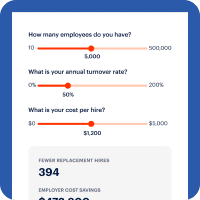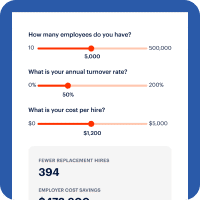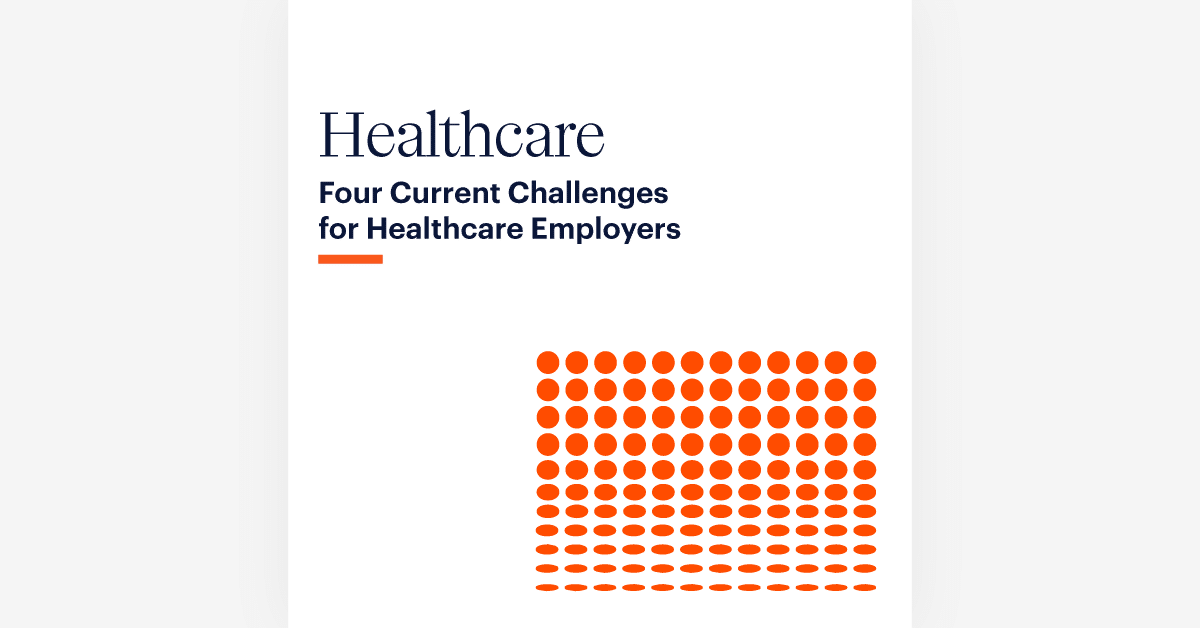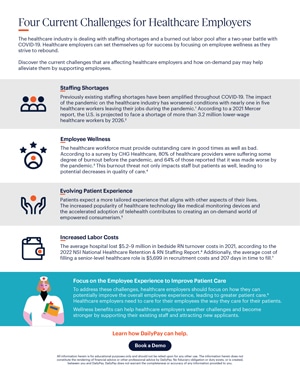Support Healthcare Employees to Overcome Challenges, Leading to Improved Care
The healthcare industry is dealing with staffing shortages and a burned-out labor pool after years of battling with COVID-19. In an effort to rebound and strengthen the workforce, healthcare employers may benefit from focusing on employee wellness.
Read on to learn about some of the current challenges that are affecting healthcare employers, and how on-demand pay may help alleviate them by providing employees with better work-life support.
Address Staffing Shortages
Healthcare employers have struggled with staffing shortages for some time, but the challenge seems to have grown exponentially over the course of the pandemic as healthcare personnel were stretched beyond their limits. The impact of the pandemic on healthcare employers and employees has worsened conditions, with a special report from Morning Consult finding that nearly one in five healthcare workers of those polled left their jobs during the pandemic.1
Insufficient staffing not only puts a strain on employees, but also has potential impacts on patient care including possible threats to patient safety.2 A short-staffed workforce can lead to medical errors and higher patient mortality rates.3
Healthcare employers should consider how to address these staffing issues and take steps to increase employee retention. Supporting healthcare employees with on-demand pay and other financial wellness benefits can go a long way towards strengthening recruitment and keeping employees longer.
Improve Employee Wellness
According to a survey done by CHG Healthcare of more than 1,200 healthcare workers, 80% of the healthcare providers surveyed were suffering some degree of burnout before the pandemic and 64% of those reported that it was made worse by the pandemic.4 This burnout threat not only impacts staff but patients as well, leading to potential decreases in the quality of care.5 The combination of pandemic-related stress and financial stress is taking a toll on employees. According to a 2022 study from PWC, financially-stressed employees are three times as likely to feel negative impact on their mental health due to money worries.6
In addition to patient care, healthcare employers should also prioritize their focus on employee wellness to better support a strained workforce.
Deliver the Best Patient Experience
Technology and consumerism have transformed how patients look at healthcare and they expect a more tailored experience that aligns with other aspects of their lives. The increased popularity of healthcare technology like medical monitoring devices and telehealth have contributed to on-demand expectations in healthcare.7
Healthcare employers must support their employees to help them keep up with these evolving patient expectations, ensuring new technologies don’t become a burden to employees but instead assist them to better perform in their roles.
Employers should increase support and resources for employees to keep them highly engaged and feeling supported to better foster a patient-first mentality. A highly engaged workforce can boost patient experience8, leading to a better experience for employers, employees and patients.
Overcome Increased Labor Costs
The average hospital (based on a study conducted of 3,000 hospitals across the country) lost between $5.2 and $9 million in bedside RN turnover costs in 2021, according to the 2022 NSI National Healthcare Retention & RN Staffing Report9. Additionally, according to survey data from healthcare AI-tech company AKASA, the average cost of filling a senior-level healthcare role is $5,699 in recruitment costs and 207 days to fill.10
With such high costs associated with employee turnover, improving the employee retention strategy can be a difference-maker for healthcare employers.
Focus on the Employee Experience to Lead to Better Patient Care
To address these challenges, healthcare employers should consider focusing on how they can improve the overall employee experience, leading to greater patient care.11 Healthcare employers can differentiate themselves by caring for their employees the way they care for their patients.
Healthcare employers should give employees what they’re looking for when it comes to wellness benefits, workplace flexibility and more support for financial wellness. This increased wellness support can help healthcare employers weather challenges and become stronger by supporting their existing staff and attracting new applicants.
Learn how DailyPay can help.
All information herein is for educational purposes only and should not be relied upon for any other use. The information herein does not constitute the rendering of financial advice or other professional advice by DailyPay. No fiduciary obligation or duty exists, or is created, between you and DailyPay. DailyPay does not warrant the completeness or accuracy of any information provided to you.
1 https://morningconsult.com/2021/10/04/health-care-workers-series-part-2-workforce/:DailyPay, 2020
2 https://www.ecri.org/press/ecri-reports-staffing-shortages-and-clinician-mental-health-are-top-threats:DailyPay, 2020
3 https://www.ncbi.nlm.nih.gov/books/NBK493175/:DailyPay, 2020
4 https://chghealthcare.com/blog/survey-healthcare-career-satisfaction-drops-burnout-rises-amid-covid-19/:DailyPay, 2020
5 https://www.ncbi.nlm.nih.gov/pmc/articles/PMC7604257/:DailyPay, 2020
6 https://www.pwc.com/us/en/services/consulting/business-transformation/library/employee-financial-wellness-survey.html:DailyPay, 2020
7 https://www.ache.org/blog/2021/consumerism-and-the-empowered-patient-experience:DailyPay, 2020
8 https://www.sogolytics.com/blog/employee-engagement-patient-experience/:DailyPay, 2020
9 https://www.nsinursingsolutions.com/Documents/Library/NSI_National_Health_Care_Retention_Report.pdf:DailyPay, 2020
10 https://www.recruitingnewsnetwork.com/posts/recruiting-time-to-fill-and-costs-spiking-in-healthcare:DailyPay, 2020
11 https://www.qualtrics.com/blog/improving-patient-experience-by-engaging-your-employees/:DailyPay, 2020
More for Hospital & Healthcare
Learn how on-demand pay may address top challenges across the industry.














